化学工程与工艺专业英语作文2
- 格式:doc
- 大小:34.00 KB
- 文档页数:10
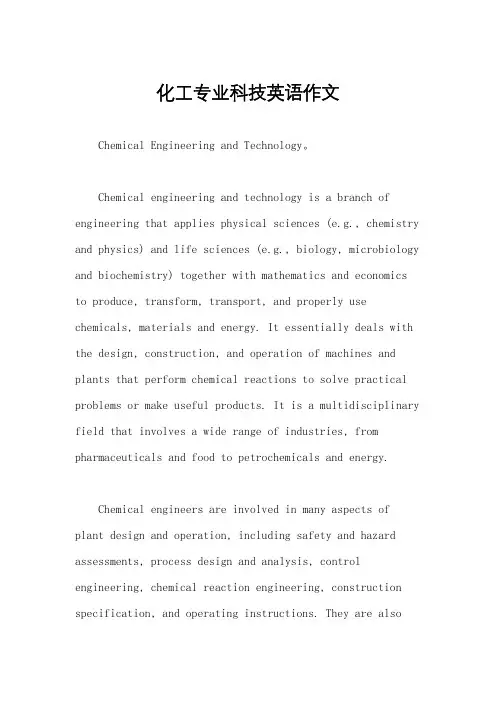
化工专业科技英语作文Chemical Engineering and Technology。
Chemical engineering and technology is a branch of engineering that applies physical sciences (e.g., chemistry and physics) and life sciences (e.g., biology, microbiology and biochemistry) together with mathematics and economics to produce, transform, transport, and properly use chemicals, materials and energy. It essentially deals with the design, construction, and operation of machines and plants that perform chemical reactions to solve practical problems or make useful products. It is a multidisciplinary field that involves a wide range of industries, from pharmaceuticals and food to petrochemicals and energy.Chemical engineers are involved in many aspects ofplant design and operation, including safety and hazard assessments, process design and analysis, control engineering, chemical reaction engineering, construction specification, and operating instructions. They are alsoresponsible for the development of new materials and technologies, such as nanotechnology, fuel cells and biomedical engineering. In addition, they play a key rolein environmental protection and the development of sustainable processes and products.Chemical engineering and technology is a rapidly growing field with great potential for future development. As the demand for energy and materials continues to increase, the need for chemical engineers will also grow. In addition, the increasing focus on environmental sustainability and the development of new technologies will create new opportunities for chemical engineers to make a significant impact on society.One of the key challenges facing chemical engineers today is the need to develop sustainable processes and products. With the increasing awareness of environmental issues and the finite nature of natural resources, there is a growing demand for processes and products that minimize waste, reduce energy consumption, and use renewable resources. Chemical engineers are at the forefront of thiseffort, developing new technologies and processes that are more sustainable and environmentally friendly.Another challenge facing chemical engineers is the need to develop new materials and technologies to meet the demands of a rapidly changing world. As new industries and technologies emerge, there is a growing need for new materials and processes that can meet the demands of these industries. Chemical engineers are working to develop new materials and technologies that can meet the needs of these industries, such as advanced materials for electronics, new materials for energy storage, and new processes for the production of biofuels.In conclusion, chemical engineering and technology is a dynamic and rapidly growing field with great potential for future development. Chemical engineers play a key role in the development of new materials and technologies, the design and operation of chemical processes, and the development of sustainable processes and products. With the increasing demand for energy and materials, and the growingfocus on environmental sustainability, the need for chemical engineers will continue to grow in the future.。
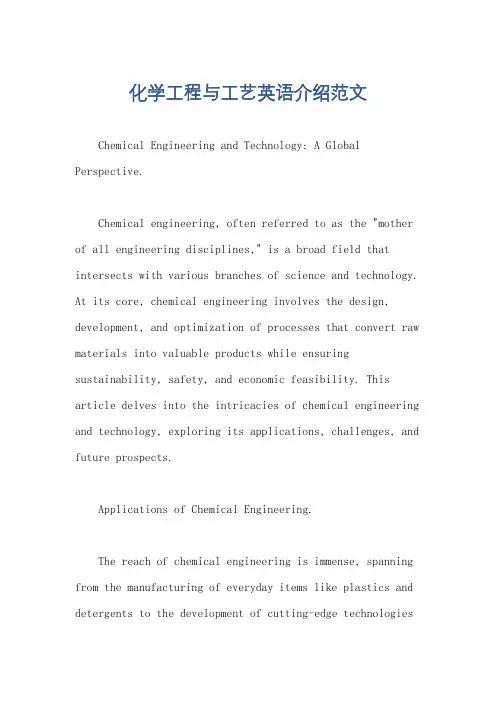
化学工程与工艺英语介绍范文Chemical Engineering and Technology: A Global Perspective.Chemical engineering, often referred to as the "mother of all engineering disciplines," is a broad field that intersects with various branches of science and technology. At its core, chemical engineering involves the design, development, and optimization of processes that convert raw materials into valuable products while ensuring sustainability, safety, and economic feasibility. This article delves into the intricacies of chemical engineering and technology, exploring its applications, challenges, and future prospects.Applications of Chemical Engineering.The reach of chemical engineering is immense, spanning from the manufacturing of everyday items like plastics and detergents to the development of cutting-edge technologiesin fields like nanotechnology and biotechnology. Let's delve into some of the key applications of chemical engineering.1. Energy Production: Chemical engineers play a pivotal role in the design and operation of energy production facilities, such as fossil fuel power plants and renewable energy systems. They optimize processes to increase efficiency, reduce emissions, and ensure the safe and reliable supply of energy.2. Pharmaceutical Industry: The pharmaceutical industry relies heavily on chemical engineering principles to develop, test, and produce drugs and medical treatments. Chemical engineers work closely with biologists, chemists, and pharmacists to ensure the safety, effectiveness, and scalability of pharmaceutical products.3. Food Processing: Chemical engineering techniques are widely used in the food processing industry to ensure the safety, quality, and nutritional value of food products. This includes the design of processing plants, optimizationof food preservation methods, and the development of new food products.4. Environmental Engineering: As environmental concerns rise, chemical engineers are increasingly involved in the development of sustainable technologies and processes that minimize waste and emissions. They help design waste treatment facilities, develop recycling methods, and optimize energy-efficient production processes.Challenges in Chemical Engineering.Despite its vast applications and contributions, chemical engineering faces several challenges that require constant innovation and research.1. Sustainability: With the growing global demand for chemical products, the industry faces pressure to reduceits environmental footprint. Chemical engineers must design processes that are energy-efficient, waste-minimizing, and environmentally sustainable. This involves the development of novel catalysts, reactors, and separation techniquesthat minimize emissions and maximize resource utilization.2. Safety: Chemical engineering involves the handling of potentially hazardous materials and processes. Ensuring worker safety and preventing accidents is a top priority. Engineers must design plants and processes that comply with strict safety standards and implement rigorous safety measures to mitigate risks.3. Complexity: Chemical engineering processes often involve numerous interacting variables and components, making them highly complex. Understanding and optimizing these processes requires sophisticated modeling and simulation techniques, as well as a deep understanding of fundamental principles.Future Prospects of Chemical Engineering.The future of chemical engineering looks bright, with numerous opportunities for growth and innovation. Here are some trends that are shaping the field:1. Digitalization and Automation: The integration of digital technologies like artificial intelligence, machine learning, and big data analytics is revolutionizing chemical engineering. These technologies enable real-time monitoring and optimization of processes, improve decision-making, and enhance safety. Automation is also enabling the development of smart factories where processes are fully automated, increasing productivity and reducing errors.2. Biotechnology and Nanotechnology: The convergence of chemical engineering with biotechnology and nanotechnology is leading to the development of novel materials, products, and processes. Biocatalysis, biosynthetic pathways, and nanomaterials are some of the exciting areas where chemical engineers are making significant contributions.3. Circular Economy: The concept of a circular economy, where resources are continuously recycled and reused, is gaining momentum. Chemical engineers are playing a key role in developing sustainable processes and products that align with this paradigm, including waste valorization, circular production systems, and renewable energy solutions.In conclusion, chemical engineering is a dynamic and diverse field that is constantly evolving to meet the challenges of the modern world. Its contributions to energy production, healthcare, food processing, and environmental sustainability are immense, and the opportunities for growth and innovation are limitless. As we move into the future, chemical engineering will continue to play apivotal role in driving technological advancements and societal progress.。
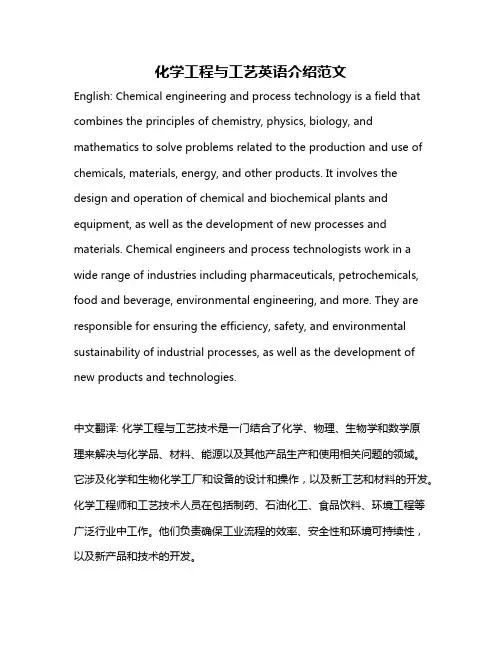
化学工程与工艺英语介绍范文English: Chemical engineering and process technology is a field that combines the principles of chemistry, physics, biology, and mathematics to solve problems related to the production and use of chemicals, materials, energy, and other products. It involves the design and operation of chemical and biochemical plants and equipment, as well as the development of new processes and materials. Chemical engineers and process technologists work in a wide range of industries including pharmaceuticals, petrochemicals, food and beverage, environmental engineering, and more. They are responsible for ensuring the efficiency, safety, and environmental sustainability of industrial processes, as well as the development of new products and technologies.中文翻译: 化学工程与工艺技术是一门结合了化学、物理、生物学和数学原理来解决与化学品、材料、能源以及其他产品生产和使用相关问题的领域。
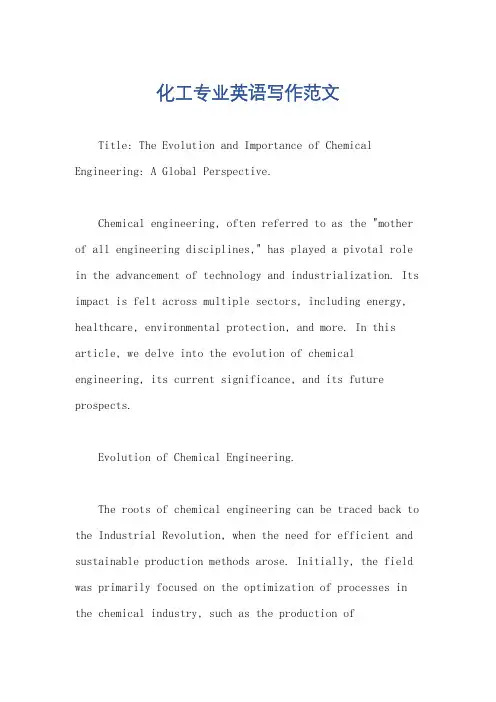
化工专业英语写作范文Title: The Evolution and Importance of Chemical Engineering: A Global Perspective.Chemical engineering, often referred to as the "mother of all engineering disciplines," has played a pivotal role in the advancement of technology and industrialization. Its impact is felt across multiple sectors, including energy, healthcare, environmental protection, and more. In this article, we delve into the evolution of chemical engineering, its current significance, and its future prospects.Evolution of Chemical Engineering.The roots of chemical engineering can be traced back to the Industrial Revolution, when the need for efficient and sustainable production methods arose. Initially, the field was primarily focused on the optimization of processes in the chemical industry, such as the production offertilizers and dyes. However, as technology advanced, the scope of chemical engineering broadened to include areas like biochemistry, environmental engineering, and nanotechnology.One of the most significant milestones in the evolution of chemical engineering was the development of the principles of reaction engineering in the early 20th century. This marked a shift from a reliance on empirical methods to a more rigorous and systematic approach, based on the principles of physics and chemistry. This development laid the foundation for the design and optimization of chemical reactors, which are crucial in the production of various chemicals.Another key development was the integration of computers into chemical engineering in the later part of the 20th century. This integration enabled engineers to model and simulate complex chemical processes, thus predicting their behavior more accurately. Computer-aided design (CAD) and computer-aided manufacturing (CAM) tools also revolutionized the design and fabrication of chemicalplants, making the process more efficient and cost-effective.Current Significance of Chemical Engineering.Today, chemical engineering is at the forefront of addressing many of the world's most pressing challenges. For instance, it plays a crucial role in the development of sustainable energy solutions. Chemical engineers are involved in the research and development of efficient solar cells, batteries, and fuel cells, as well as in the optimization of biofuel production processes.In healthcare, chemical engineering has madesignificant contributions to the development of drugs and therapies. By manipulating molecules at the nanoscale, engineers are able to create targeted drugs that are more effective and have fewer side effects. They are also involved in the design of medical devices and the optimization of bioprocessing techniques for tissue engineering and regenerative medicine.Moreover, chemical engineering is essential in addressing environmental challenges. Engineers are working to develop more efficient waste treatment and recycling methods, as well as to mitigate the impact of industrial processes on the environment. They are also involved in the research and development of sustainable materials that can replace traditional, environmentally harmful ones.Future Prospects of Chemical Engineering.The future of chemical engineering looks bright, with numerous opportunities for innovation and growth. One area that is expected to witness significant advancements is biotechnology. With the advent of synthetic biology and genome editing tools like CRISPR-Cas9, chemical engineers will be able to design and engineer cells and organisms with enhanced functionalities. This could lead to the development of novel bioproducts, such as bioplastics and biofuels, that are more sustainable and environmentally friendly.Another area of potential growth is nanotechnology.Chemical engineers are exploring the use of nanomaterialsin various applications, including drug delivery, energy storage, and environmental remediation. The uniqueproperties of nanomaterials, such as their large surface area and enhanced reactivity, make them ideal foraddressing many of the challenges faced by the chemical industry.Lastly, the integration of digital technologies, suchas artificial intelligence (AI) and the Internet of Things (IoT), is expected to transform chemical engineering. These technologies can be used to optimize processes in real-time, predict and prevent failures, and improve safety and sustainability. By leveraging the power of data analytics and predictive modeling, chemical engineers will be able to make more informed decisions and develop more efficient and cost-effective processes.In conclusion, chemical engineering has come a long way since its inception and continues to play a pivotal role in addressing the world's most pressing challenges. As we look to the future, it is exciting to imagine the innovativesolutions that chemical engineers will develop and the impact they will have on society.。

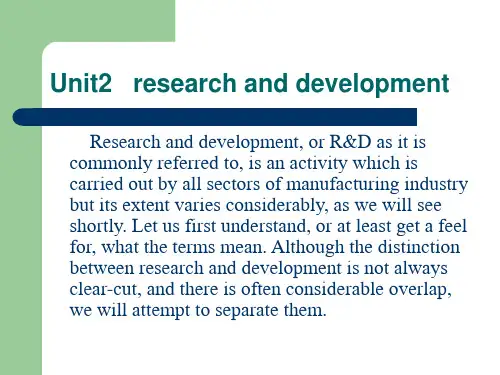
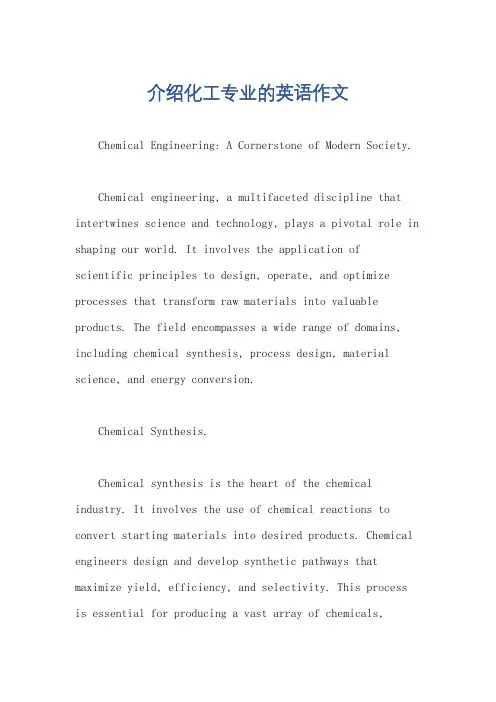
介绍化工专业的英语作文Chemical Engineering: A Cornerstone of Modern Society.Chemical engineering, a multifaceted discipline that intertwines science and technology, plays a pivotal role in shaping our world. It involves the application ofscientific principles to design, operate, and optimize processes that transform raw materials into valuable products. The field encompasses a wide range of domains, including chemical synthesis, process design, material science, and energy conversion.Chemical Synthesis.Chemical synthesis is the heart of the chemical industry. It involves the use of chemical reactions to convert starting materials into desired products. Chemical engineers design and develop synthetic pathways that maximize yield, efficiency, and selectivity. This process is essential for producing a vast array of chemicals,including pharmaceuticals, plastics, fertilizers, and fuels. Process Design.Chemical processes are complex operations that require careful design and optimization. Chemical engineers use mathematical modeling, simulation, and computational toolsto design and scale up chemical processes. They determinethe optimal operating conditions, equipment design, and process control strategies to ensure safety, efficiency,and environmental sustainability.Material Science.Materials science involves the study and development of new materials with tailored properties. Chemical engineers collaborate with materials scientists to design and synthesize materials that meet specific requirements for applications in various industries. These could include lightweight and strong materials for aerospace, corrosion-resistant coatings for chemical processing, orbiocompatible materials for medical devices.Energy Conversion.Energy conversion is another critical aspect of chemical engineering. Chemical engineers design and develop technologies for the efficient conversion of various energy sources, such as fossil fuels, biomass, and solar energy. This field plays a vital role in addressing global energy challenges, reducing greenhouse gas emissions, and promoting sustainable development.Education and Career Opportunities.Pursuing a degree in chemical engineering opens doors to a wide range of career opportunities. Chemical engineers find employment in various industries, including petrochemicals, pharmaceuticals, biotechnology, food processing, and environmental engineering. They work in roles such as process design, plant operation, research and development, and technical management.Chemical engineering programs typically require astrong foundation in mathematics, physics, and chemistry. Students also gain hands-on experience through laboratory courses and research projects. Many universities offer specialized programs in specific areas, such as bioprocess engineering, energy systems, or computational chemical engineering.Conclusion.Chemical engineering is an essential field that drives innovation and progress in modern society. It encompasses a diverse range of disciplines, from chemical synthesis to process design, material science, and energy conversion. Chemical engineers play a crucial role in developing and optimizing processes that produce valuable products, advance scientific research, and address global challenges. With its focus on sustainability, efficiency, and innovation, chemical engineering continues to be a cornerstone of modern society and a promising career path for those who seek to make a tangible impact on the world.。
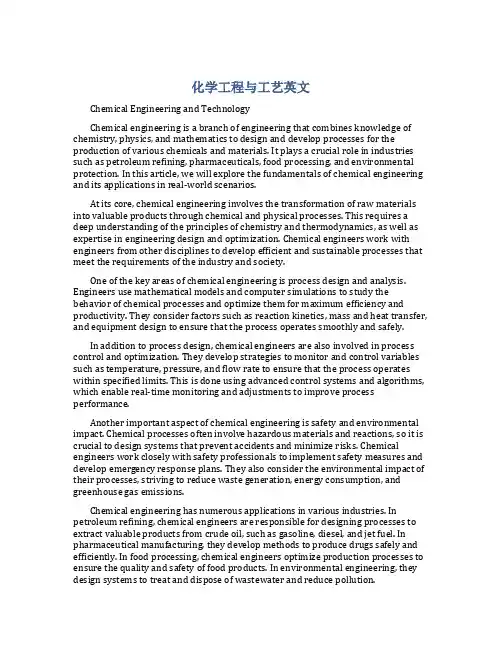
化学工程与工艺英文Chemical Engineering and TechnologyChemical engineering is a branch of engineering that combines knowledge of chemistry, physics, and mathematics to design and develop processes for the production of various chemicals and materials. It plays a crucial role in industries such as petroleum refining, pharmaceuticals, food processing, and environmental protection. In this article, we will explore the fundamentals of chemical engineering and its applications in real-world scenarios.At its core, chemical engineering involves the transformation of raw materials into valuable products through chemical and physical processes. This requires a deep understanding of the principles of chemistry and thermodynamics, as well as expertise in engineering design and optimization. Chemical engineers work with engineers from other disciplines to develop efficient and sustainable processes that meet the requirements of the industry and society.One of the key areas of chemical engineering is process design and analysis. Engineers use mathematical models and computer simulations to study the behavior of chemical processes and optimize them for maximum efficiency and productivity. They consider factors such as reaction kinetics, mass and heat transfer, and equipment design to ensure that the process operates smoothly and safely.In addition to process design, chemical engineers are also involved in process control and optimization. They develop strategies to monitor and control variables such as temperature, pressure, and flow rate to ensure that the process operates within specified limits. This is done using advanced control systems and algorithms, which enable real-time monitoring and adjustments to improve process performance.Another important aspect of chemical engineering is safety and environmental impact. Chemical processes often involve hazardous materials and reactions, so it is crucial to design systems that prevent accidents and minimize risks. Chemical engineers work closely with safety professionals to implement safety measures and develop emergency response plans. They also consider the environmental impact of their processes, striving to reduce waste generation, energy consumption, and greenhouse gas emissions.Chemical engineering has numerous applications in various industries. In petroleum refining, chemical engineers are responsible for designing processes to extract valuable products from crude oil, such as gasoline, diesel, and jet fuel. In pharmaceutical manufacturing, they develop methods to produce drugs safely and efficiently. In food processing, chemical engineers optimize production processes to ensure the quality and safety of food products. In environmental engineering, they design systems to treat and dispose of wastewater and reduce pollution.As technology advances, chemical engineering continues to evolve and address new challenges. Emerging areas such as nanotechnology and biotechnology offer exciting opportunities for chemical engineers to develop innovative processes and materials. For example, chemical engineers are exploring the use of nanoparticles for drug delivery and the production of advanced materials with unique properties.In conclusion, chemical engineering is a multidisciplinary field that combines chemistry, physics, and mathematics with engineering principles. It plays a vital role in the development of processes and products in various industries. Chemical engineers design and optimize processes, control variables, ensure safety, and minimize environmental impact. With ongoing advancements in technology, the field of chemical engineering continues to grow, offering new possibilities and contributing to the advancement of society.。
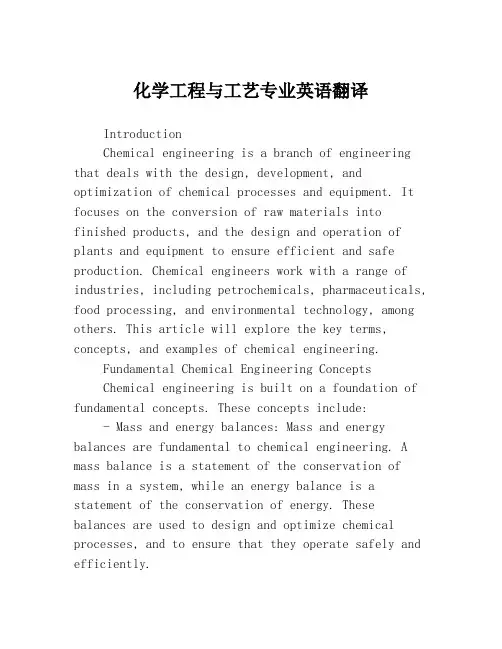
化学工程与工艺专业英语翻译IntroductionChemical engineering is a branch of engineering that deals with the design, development, and optimization of chemical processes and equipment. It focuses on the conversion of raw materials into finished products, and the design and operation of plants and equipment to ensure efficient and safe production. Chemical engineers work with a range of industries, including petrochemicals, pharmaceuticals, food processing, and environmental technology, among others. This article will explore the key terms, concepts, and examples of chemical engineering.Fundamental Chemical Engineering ConceptsChemical engineering is built on a foundation of fundamental concepts. These concepts include: - Mass and energy balances: Mass and energy balances are fundamental to chemical engineering. A mass balance is a statement of the conservation of mass in a system, while an energy balance is a statement of the conservation of energy. These balances are used to design and optimize chemical processes, and to ensure that they operate safely and efficiently.- Basic thermodynamics: Thermodynamics is the study of heat, work, and energy. Chemical engineers use thermodynamics to design and optimize chemical processes, and to determine the properties of chemical systems.- Chemical kinetics: Chemical kinetics is the study of reaction rates and mechanisms. Chemical engineers use chemical kinetics to design and optimize chemical processes, and to determine the properties of chemical systems.- Process control: Process control is the studyof how to control chemical processes to ensure that they operate safely and efficiently. Control systems are used to regulate key process variables, such as temperature, pressure, and flowrate.- Transport phenomena: Transport phenomena arethe processes by which mass, energy, and momentum are transported through a system. Chemical engineers use transport phenomena to design and optimize chemical processes, and to determine the properties of chemical systems.Chemical Engineering ApplicationsChemical engineering has many applications in a wide range of industries. Some of the key applications include:- Petrochemicals: Chemical engineers design and optimize the processes used to produce fuels andchemicals from petroleum. This includes processes such as refining, cracking, and catalysis.- Pharmaceuticals: Chemical engineers design and optimize the processes used to produce pharmaceuticals. This includes processes such as synthesis,purification, and formulation.- Food processing: Chemical engineers design and optimize the processes used to produce food products. This includes processes such as mixing, separation,and packaging.- Environmental technology: Chemical engineers design and optimize the processes used to treat and recycle waste streams. This includes processes such as bioremediation, wastewater treatment, and airpollution control.- Energy: Chemical engineers design and optimize the processes used to produce and store energy. This includes processes such as combustion, gasification, and hydrogen production.ConclusionChemical engineering is a diverse and excitingfield that plays a vital role in many industries. Itis built on a foundation of fundamental concepts, such as mass and energy balances, thermodynamics, chemical kinetics, process control, and transport phenomena. Chemical engineers use these concepts to design and optimize chemical processes and equipment, and toensure efficient and safe production. Some of the key applications of chemical engineering include petrochemicals, pharmaceuticals, food processing, environmental technology, and energy.。
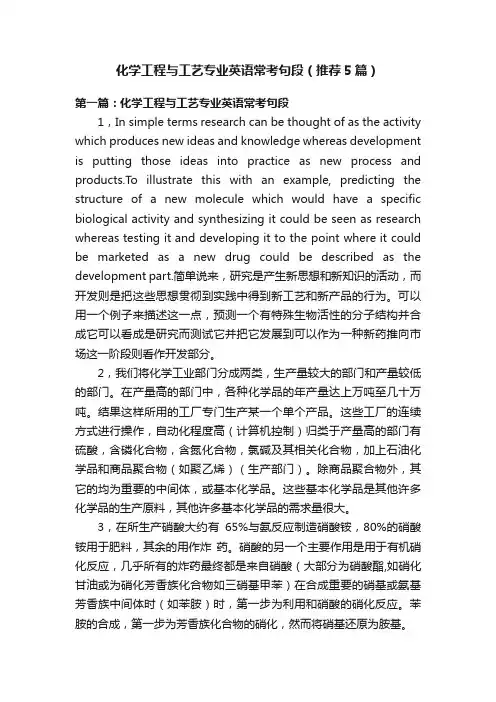
化学工程与工艺专业英语常考句段(推荐5篇)第一篇:化学工程与工艺专业英语常考句段1,In simple terms research can be thought of as the activity which produces new ideas and knowledge whereas development is putting those ideas into practice as new process and products.To illustrate this with an example, predicting the structure of a new molecule which would have a specific biological activity and synthesizing it could be seen as research whereas testing it and developing it to the point where it could be marketed as a new drug could be described as the development part.简单说来,研究是产生新思想和新知识的活动,而开发则是把这些思想贯彻到实践中得到新工艺和新产品的行为。
可以用一个例子来描述这一点,预测一个有特殊生物活性的分子结构并合成它可以看成是研究而测试它并把它发展到可以作为一种新药推向市场这一阶段则看作开发部分。
2,我们将化学工业部门分成两类,生产量较大的部门和产量较低的部门。
在产量高的部门中,各种化学品的年产量达上万吨至几十万吨。
结果这样所用的工厂专门生产某一个单个产品。
这些工厂的连续方式进行操作,自动化程度高(计算机控制)归类于产量高的部门有硫酸,含磷化合物,含氮化合物,氯碱及其相关化合物,加上石油化学品和商品聚合物(如聚乙烯)(生产部门)。
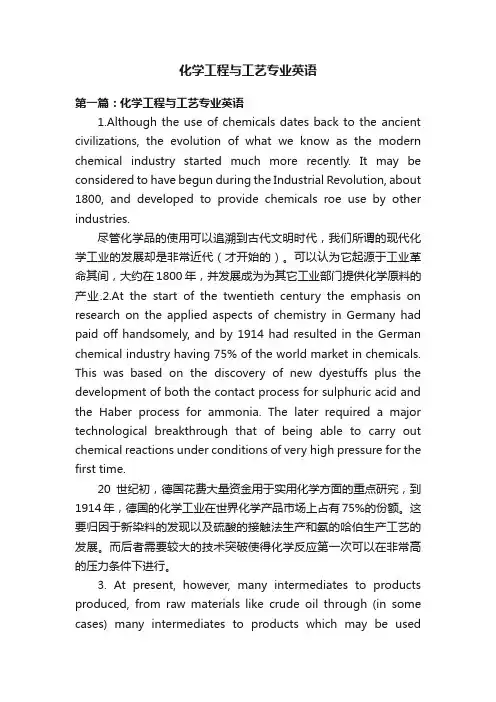
化学工程与工艺专业英语第一篇:化学工程与工艺专业英语1.Although the use of chemicals dates back to the ancient civilizations, the evolution of what we know as the modern chemical industry started much more recently. It may be considered to have begun during the Industrial Revolution, about 1800, and developed to provide chemicals roe use by other industries.尽管化学品的使用可以追溯到古代文明时代,我们所谓的现代化学工业的发展却是非常近代(才开始的)。
可以认为它起源于工业革命其间,大约在1800年,并发展成为为其它工业部门提供化学原料的产业.2.At the start of the twentieth century the emphasis on research on the applied aspects of chemistry in Germany had paid off handsomely, and by 1914 had resulted in the German chemical industry having 75% of the world market in chemicals. This was based on the discovery of new dyestuffs plus the development of both the contact process for sulphuric acid and the Haber process for ammonia. The later required a major technological breakthrough that of being able to carry out chemical reactions under conditions of very high pressure for the first time.20世纪初,德国花费大量资金用于实用化学方面的重点研究,到1914年,德国的化学工业在世界化学产品市场上占有75%的份额。
介绍化工专业的英语作文英文回答:Chemical engineering is a fascinating field that combines principles of chemistry, physics, and mathematics to design and operate processes that convert raw materials into valuable products. As a chemical engineering student, I have learned how to apply scientific knowledge to solve practical problems in various industries such as pharmaceuticals, energy, and environmental protection.One of the reasons I chose to study chemical engineering is because of the wide range of career opportunities available in this field. For example, chemical engineers can work in research and development, process design, production, quality control, and even sales and marketing. This versatility allows me to explore different areas and find a job that best suits my interests and skills.In addition, chemical engineering is a constantly evolving field, with new technologies and innovations being developed all the time. For instance, I recently learned about the use of nanotechnology in drug delivery systems, which has the potential to revolutionize the pharmaceutical industry. Being able to work on cutting-edge projects like this is both challenging and rewarding.Furthermore, studying chemical engineering has taught me valuable skills such as problem-solving, critical thinking, and teamwork. These skills are not only important in my academic studies but also in my future career. For example, during a group project to design a water treatment plant, I had to collaborate with my classmates to come up with creative solutions to complex problems. This experience not only improved my technical knowledge but also my communication and leadership skills.Overall, studying chemical engineering has been a rewarding experience that has prepared me for a successful career in a dynamic and fast-paced industry.中文回答:化工专业是一个迷人的领域,它结合了化学、物理和数学原理,设计和操作过程,将原材料转化为有价值的产品。
化学工程英语作文ChatGPT:1. Living in the Lab: The Thrill of Chemical Engineering。
Imagine stepping into a world where elements dance and reactions ignite, creating a symphony of progress that's the realm of chemical engineering. It's not just about mixing chemicals, but a journey of innovation and problem-solving.2. The Alchemist's Craft。
Chemical engineers are like modern alchemists, transmuting raw materials into valuable products. They blend science with art, turning simple substances intolife-changing technologies. It's a blend of precision and intuition, where every drop counts.3. The Catalyst of Change。
In our ever-evolving world, chemical engineering is the catalyst that accelerates progress. From clean energy to life-saving drugs, their work touches every aspect of our daily lives. It's not just about making things, but making them better.4. The Lab's Laboratory。
化学工程与工艺英语1. IntroductionChemical engineering and process technology is a branch of engineering that deals with the application of science, particularly chemistry and physics, to the design, operation, and optimization of chemical processes. It plays a vital role in various industries such as petroleum, pharmaceuticals, food processing, and environmental protection. In this document, we will explore some key terms and concepts related to chemical engineering and process technology in English.2. Chemical Engineering Processes2.1 DistillationDistillation is a commonly used separation technique in chemical engineering. It involves the separation of two or more components based on their different boiling points. The process typically involves heating a liquid mixture and then condensing and collecting the vapor. Some important terms related to distillation include:•Fractional distillation: A distillation technique used when the boiling points of the components are close, allowing for more precise separation.•Azeotrope: A mixture of two or more liquids that forms a constant boiling point mixture. It cannot beseparated by simple distillation.•Reflux: The technique of continuously returning some of the condensed liquid back to the distillationapparatus to improve separation efficiency.2.2 Reaction EngineeringReaction engineering focuses on the design and optimization of chemical reactions in industrial processes. Some key terms related to reaction engineering include:•Catalyst: A substance that increases the rate of a chemical reaction without being consumed in the process.•Rate of reaction: The speed at which a reaction occurs, typically measured in moles per unit time.•Chemical equilibrium: A state in a reversible reaction where the rate of the forward reaction is equal to the rate of the reverse reaction, resulting in no net change in the concentrations of reactants and products.2.3 Heat TransferHeat transfer is an important aspect of chemical engineering as it deals with the movement of heat energy from one place to another. Some key terms related to heat transfer include:•Conduction: The transfer of heat through direct contact of particles.•Convection: The transfer of heat through the movement of fluids or gases.•Radiation: The transfer of heat throughelectromagnetic waves.3. Equipment and Units3.1 ReactorsReactors are vessels where chemical reactions take place. Some commonly used reactors in chemical engineering include:•Batch reactor: A reactor that operates with a fixed volume and is suitable for small-scale production or forreactions that require precise control.•Continuous stirred-tank reactor (CSTR): A reactor that operates with a continuous flow of reactantsand products, allowing for better control of reactionconditions.3.2 Distillation ColumnsDistillation columns are used in distillation processes to separate mixtures by their boiling points. Some important components of distillation columns include:•Reboiler: A heat exchanger that provides heat to the bottom of the distillation column, causing the liquid tovaporize.•Condenser: A heat exchanger that cools the vapor and condenses it back into liquid form.3.3 Heat ExchangersHeat exchangers are devices used to transfer heat between two or more fluids. Some commonly used types of heat exchangers in chemical engineering include:•Shell and tube heat exchanger: Consists of a series of tubes through which one fluid flows, while another fluid flows around the tubes in the shell.•Plate heat exchanger: Consists of a series of metal plates with alternating channels for the hot and cold fluids.4. Safety and Environmental ProtectionChemical engineering places a strong emphasis on safety and environmental protection. Some key terms related to safety and environmental protection in chemical engineering include:•Hazardous substances: Chemicals that present a risk to human health, safety, or the environment.•Risk assessment: The process of evaluating the potential hazards and risks associated with a chemicalprocess or operation.•Emissions control: The techniques and measures used to reduce harmful emissions into the environment.5. ConclusionThis document has provided an overview of some key terms and concepts related to chemical engineering and process technology in English. These terms are crucial for effective communication and understanding in the field. By familiarizing yourself with these terms, you can enhance your knowledge and be better equipped to navigate the world of chemical engineering and process technology.。
化工专业英文自我介绍范文英文回答:Hello everyone, my name is [insert name]. I am a chemical engineering student at [insert university]. I am passionate about chemistry and engineering, and I am eager to learn more about the field. I am also interested in research and development, and I hope to one day work in the chemical industry.I am a hard worker and I am always willing to learn new things. I am also a team player and I am able to work well with others. I am confident that I have the skills and the determination to succeed in the chemical engineering field.Why I chose chemical engineering?I have always been interested in science and math, and I have always been good at them. I also enjoy working with my hands, and I am good at solving problems. Chemicalengineering is a field that combines all of these interests. It is a challenging and rewarding field, and I am excitedto be a part of it.What are my career goals?My career goals are to work in the chemical industryand to make a positive impact on the world. I want to usemy skills and knowledge to develop new products and technologies that will help to improve people's lives. I also want to work with others to promote sustainability and environmental protection.What are my strengths?My strengths include my strong academic record, my problem-solving skills, and my ability to work well with others. I am also a hard worker and I am always willing to learn new things.What are my weaknesses?My weaknesses include my lack of experience in the chemical industry and my limited knowledge of some of the software used in the field. I am confident that I can overcome these weaknesses through hard work and dedication.中文回答:大家好,我叫 [中文名]。
Unit 1 Chemical Industry化学工业1.Origins of the Chemical IndustryAlthough the use of chemicals dates back to the ancient civilizations, the evolution of what we know as the modern chemical industry started much more recently. It may be considered to have begun during the Industrial Revolution, about 1800, and developed to provide chemicals roe use by other industries. Examples are alkali for soapmaking, bleaching powder for cotton, and silica and sodium carbonate for glassmaking. It will be noted that these are all inorganic chemicals. The organic chemicals industry started in the 1860s with the exploitation of William Henry Perkin’s discovery if the first synthetic dyestuff—mauve. At the start of the twentieth century the emphasis on research on the applied aspects of chemistry in Germany had paid off handsomely, and by 1914 had resulted in the German chemical industry having 75% of the world market in chemicals. This was based on the discovery of new dyestuffs plus the development of both the contact process for sulphuric acid and the Haber process for ammonia. The later required a major technological breakthrough that of being able to carry out chemical reactions under conditions of very high pressure for the first time. The experience gained with this was to stand Germany in good stead, particularly with the rapidly increased demand for nitrogen-based compounds (ammonium salts for fertilizers and nitric acid for explosives manufacture) with the outbreak of world warⅠin 1914. This initiated profound changes which continued during the inter-war years (1918-1939).1.化学工业的起源尽管化学品的使用可以追溯到古代文明时代,我们所谓的现代化学工业的发展却是非常近代(才开始的)。
化学工程与工艺英文介绍怎么写Chemical engineering and process is an interdisciplinary field that involves the application of chemistry, physics, and mathematics principles to design and operate chemical processes. It plays a crucial role in transforming raw materials into valuable products through various chemical reactions and separation techniques. This article aims to provide a concise introduction to the field of chemical engineering and process, highlighting its importance and fundamental principles.Chemical engineering encompasses a wide range of industries including petroleum refining, pharmaceuticals, food and beverage production, renewable energy, and environmental engineering. It involves the design, construction, and optimization of chemical processes and equipment to achieve the desired production goals efficiently and safely.One of the key aspects of chemical engineering is process design. It involves the selection of appropriate raw materials, the determination of reaction conditions, and the design of reactors and separation units. This requires a deep understanding of chemical kinetics, thermodynamics, and transport phenomena. By utilizing mathematical modeling and simulation techniques, chemical engineers can optimize the process design and predict the performance of the system before it is implemented on an industrial scale.In addition to process design, chemical engineers are responsible for process control and optimization. They develop strategies to monitor and control the variables in the system to ensure the process operates within safe and efficient parameters. This involves the use of advanced control systems and real-time data analysis. By continuously monitoring the process and making necessary adjustments, chemical engineers can maximize production efficiency and minimize waste generation.Safety is a paramount concern in chemical engineering. Chemical engineers are trained to identify and mitigate potential hazards associated with chemical processes. They implement safety measures such as the use of protective equipment, hazard identification and risk assessment, and emergency response planning. By ensuring a safe working environment, chemical engineers help protect the workers, the environment, and the surrounding communities.Sustainability is another important aspect of chemical engineering. With the increasing concern for environmental protection and resource conservation, chemical engineers strive to develop eco-friendly processes and technologies. They focus on energy efficiency, waste minimization, and the utilization of renewable resources. By integrating sustainability principles into the design and operation of chemical processes, chemical engineers contribute to a more sustainable and greener future.Furthermore, research and development play a crucial role in advancing the field of chemical engineering. Chemical engineers conduct experiments, analyze data, and develop new processes and materials. Their research efforts contribute to the development of innovative technologies and the improvement of existing processes. Through collaboration with scientists and engineers from other disciplines, chemical engineers contribute to the advancement of various industries and the overall progress of society.In conclusion, chemical engineering and process is a dynamic and multidisciplinary field that involves the design, operation, and optimization of chemical processes. It encompasses various industries and addresses important challenges such as process efficiency, safety, sustainability, and innovation. Through their knowledge and expertise, chemical engineers contribute to the development of new technologies, the improvement of existing processes, and the overall progress of society.。
Curriculum of chemical engineeringAs chemical engineering knowledge developed, it was inserted into university courses and curricula. Before World WarⅠ, chemical engineering programs were distinguishable from chemistry programs in that they contained courses in engineering drawing, engineering thermodynamics, mechanics, and hydraulics taken from engineering departments. Shortly after World WarⅠthe first text in unit operations was published. Courses in this area became the core of chemical engineering teaching.By the mid-1930s, chemical engineering programs included courses in (1) stoichiometry (using material and energy conservation ideas to analyze chemical process steps), (2) chemical processes or “unit operations”, (3) chemical engineering laboratories “in which equipment was operated and tested”, and (4) chemical plant design (in which cost factors were combined with technical elements to arrive at preliminary plant designs). The student was still asked to take the core chemistry courses, including general, analytical, organic, and physical chemistry. However, in addition, he or she took courses in mechanical drawing, engineering mechanics, electric circuits, metallurgy, and thermo-dynamics with other engineers.Since World War Ⅱchemical engineering has develop rapidly.As new disciplines have proven useful, they have been added to the curriculum. Chemical engineering thermodynamics became generally formulated and taught by about 1945. By 1950, courses in applied chemical kinetics and chemical reactor design appeared. Process control appeared as an undergraduate course in about 1955, and digital computer use began to develop about 1960.The idea that the various unit operations depended on common mechanisms of heat, mass, and momentum transfer developed about 1960. Consequently, courses in transport phenomena assumed an important position as an underlying, unifying basis for chemical engineering education. New general disciplines that have emerged in the last two decades include environmental and safety engineering, biotechnology, and electronics manufacturing processing. There has been an enormous amount of development in all fields, much of it arising out of more powerful computing and applied mathematics capabilities.1.Science and Mathematics CoursesChemistryChemical engineers continue to need background in organic, inorganic and physical chemistry, but also should introduced to the principles of instrumental analysis and biochemistry.· Valuable conceptual material should be strongly emphasized in organic chemistry including that associated with biochemical process.· Much of thermodynamic is more efficiently taught in chemical engineering, and physical chemistry should include the foundations of thermodynamic.Physics.Biology.· Biology has emerged from the classification stage, and modern molecular biology holds great promise for application. Future graduates will become involved with applying this knowledge at some time in their careers.· A special course is required on the functions and characteristics of living cells with some emphasis on genetic engineering as practiced with microorganisms.Materials Science.·Course work should include the effects of microstructure on physical, chemical, optical, magnetic and electronic properties of solids.·Fields of study should encompass ceramics, polymers, semiconductors, metals, and composites.Mathematics.Computer Instruction.·Although students should develop reasonable proficiency in programming, the main thrust should be that use of standard software including the merging of various programs to accomplish a given task. Major emphasis should be on how to analyze and solve problems with existing software including that for simulation to evaluate and check such software with thoroughness and precision.·Students should learn how to critically evaluate programs written by others.· All courses involving calculations should make extensive use of the computer and the latest software. Such activity should be more frequent as students progress in the curriculum. Adequate computer hardware and software must be freely available to the student through superior centralized facilities and/or individual PC’s. Development of professionally written software for chemical engineering should be encouraged.2.Chemical engineering coursesThermodynamics.· The important concepts of the courses should be emphasized; software should e developed to implement the concepts in treating a wide variety of complex, yet interesting, problems in a reasonable time. The value of analysis of units and dimensions in checkingproblems should continue to be emphasized.· Examples in thermodynamics should involve problems from a variety of industries so that the subject comes alive and its power in decision making is clearly emphasized.Kinetics, Catalysis, and Reactor Design and Analysis.·This course also needs a broad variety of real problems, not only design but also diagnostic and economic problems. Real problems involve real compounds and the chemistry related to them.·Existing software for algebraic and differential equation solving make simulation and design calculation on many reactor systems quite straightforward.· Shortcut estimating methods should be emphasized in addition to computer calculations.·The increased production of specialties make batch ad semibatch reactor more important, and scale-up of laboratory studies is an important technique in the fast-moving specialties business.3.Unit OperationsThe unit operations were conceived as an organized means for discussing the many kind of equipment-oriented physical processes required in the process industries. This approach continues to be valid. Over the years some portions have bee given separate statussuch as transport phenomena and separations while some equipment and related principles have not been included in the required courses, as is the case with polymer processing, an area in which all chemical engineers should have some knowledge.·Transport phenomena principles can be made more compelling by using problems form a wide range of industries that can be analyzed and solved using the principles taught.·Some efficiency may be gained by teaching several principles and procedures for developing specifications and selection the large number of equipment items normally purchased off-the-shelf or as standard design.·A great deal of time can be saved in addressing designed equipped such as fractionators and absorbers be emphasizing rigorous computer calculations and the simplest shortcut procedures. Most intermediate calculation procedures and graphical methods should be eliminated unless they have real conceptual value.Process Control.·This course should emphasize control strategy and precise measurement in addition to theory.·Some hands-on experience using current practices of computer control with industrial-type consoles should be encouraged.·Computer simulation of processes for demonstration of controlprinciples and techniques can be most valuable, but contact with actual control devices should not be ignored.Chemical engineering laboratories.·Creative problem solving should be emphasized.·Reports should be written as briefly as possible; they should contain an executive summary with clearly drawn conclusions and brief observations and explanations with graphical rather than tabular representation of data. A great deal of such graphing can be done in the laboratory on computers with modern graphics capabilities. Detailed calculations should be included in an appendix.·Some part of the laboratory should be structured to relate to product development,Design/Economics·In the design course in engineering, students learn the techniques of complex problem solving and decision making within a framework of economic analysis. The very nature of processes requires a system approach’ the ability to analyze a total system is one of the special attributes of chemical engineers that will continue to prove most sought after in a complex technological world.·Because of the greater diversity of interests and job opportunities, some consideration should be given to providing a variety of short design problem of greatest personal interest.·The design approach can be most valuable in diagnosing plant problems, and some practice in this interesting area should be provided.·Rigorous economic analysis and predictive efforts should be required in all decision processes.·Safety and environmental considerations should also be emphasized.·Modern simulation tools should be made available to the students.Other Engineering Courses.The electrical engineering courses should emphasize application of microprocessors, lasers, sensing devices, and control systems as well as the traditional areas of circuits and motors. The course should provide insight into the principles on which each subject is based.Remaining courses in engineering mechanics and engineering drawing should be considered for their relevance to current and future chemical engineering practice.4.Other coursesEconomics and Business courses.It is difficult to find a single course in economics or business departments that covers the various needs of engineers. Thequalitative ability of engineers makes it possible to teach following topics in a single-semester course—in many cases in the Chemical Engineering Department: business economics, project economic analysis, economic theory, marketing and market studies, and national and global economics.Humanities and Social Science Courses.It is important to understand the origins of one’s own culture as well as that of others.Communication Course.Since improved communication skills require continuous attention, the following requirements may be useful:·Oral presentations in at least one course each year.·Several literature surveys in the junior and senior years.·Introduce computer-based communication systems.Area of Specialization.The elective areas should be generous in hours to maximize freedom of choice. Each department will have to consider its own and its total university resources and strenghs as well as the quality and preparation of its students. The suggested areas are: ·Life sciences and applications·Materials sciences and applications·Catalysis and electrochemical science and applications·Separations technology·Computer applications technology·Techniques of product development and marketing·Polymer technologyEach of these areas should be strongly career-oriented. The interest in a given area will depend on opportunities perceived by the students.。